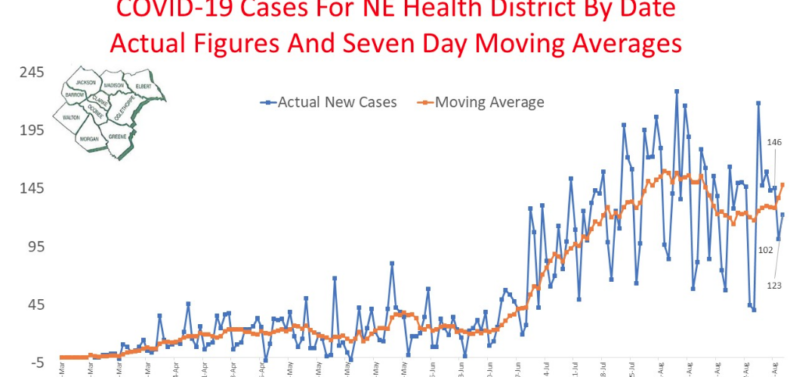While Georgia appears to be trending the right way on COVID-19 cases the past few weeks, the Athens region is going in the opposite direction.
As of last week, Georgia was fourth among states in new cases per 100,000 people. Not great, Bob, but better than first, which was where Georgia was sitting earlier this month. Still, almost all of Georgia’s 159 counties, including Clarke, should be under a shelter-in-place order, according to the Harvard Global Health Institute.
Meanwhile, many University of Georgia students are doing anything but sheltering in place. The Red & Black sent reporters downtown and found that some bars are enforcing capacity limits, but others aren’t, and apparently no one is enforcing social distancing or masks on the sidewalk as students wait to get inside. Athens-Clarke County’s mask ordinance not only requires masks inside businesses—although businesses can opt out, as many college bars have—but also outdoors when social distancing isn’t possible.
The student newspaper also reported that UGA Vice President for Student Affairs Victor Wilson sent a letter Aug. 22 to Greek organizations warning that the level of partying at fraternity houses is unacceptable. Several sororities also allegedly skirted virtual rush by hosting recruits in person.
“The off-campus gatherings, the lack of compliance to good public health practices, and the continued behaviors that put your friends’ and community members’ health in jeopardy HAVE TO STOP,” Wilson wrote. He must be shocked that college students are… acting like college students.
In response, the Inter-Fraternity Council passed a rule restricting visitors after 7 p.m. But the IFC has not curtailed parties attended by fraternity members, although alcohol isn’t supposed to be served at gatherings of 50 or more. Gov. Brian Kemp’s executive order bans gatherings of more than 50 altogether.
Before classes began, data gathered by the New York Times ranked UGA third among universities nationwide for the highest number of COVID-19 cases reported. UGA’s data gathering has been imperfect, to say the least. It relies on positive tests taken at the University Health Center, as well as any taken elsewhere that may have been self-reported. There is no way to know for sure how many students, faculty and staff have been exposed to coronavirus.
But what numbers exist are trending upward. UGA reported 173 positive tests for the week of Aug. 17-21, up from 68 cases the previous week. The positive rate for UGA’s own tests rose from 0.38% to 2.35% from move-in week to the first week of classes. That’s well below the nationally recommended positive rate of 5% for reopening, but keep in mind that so far UGA has only tested asymptomatic volunteers in what it calls a pilot program. This week, the university is asking a random sampling of students to come get tested—better, but still unscientific. And even if the 2.35% positive rate is correct, that still means 1,200 faculty, staff and students are walking around with COVID-19.
UGA is also testing just 300 people per day. Compare that to Georgia Tech, which is testing 1,500 people per day, or the University of Illinois, which is testing about 20,000 people per day. UGA’s testing is being done by the vet school; Tech doesn’t have a vet school, nor a college of public health or medical school, and is still crushing UGA in this regard. Tech, like Illinois, is using a new saliva test that received emergency approval from the Food and Drug Administration. Any certified lab—and UGA recently approved such certification—can conduct these tests, which don’t require swabs that are in short supply and can be analyzed with a wider variety of reagents than swab tests. But hey, if you don’t know there’s an outbreak on campus, you don’t have to refund anyone’s dorm or meal plan money, and you don’t have to call off football, right?
Cases spiked in early July, a few weeks after Kemp reopened bars and other types of businesses that have a high risk of spreading coronavirus. Now, Georgia appears to be flattening the curve again, perhaps because of local mask mandates. That’s good news. But it doesn’t appear to apply to the Athens region. The 10-county Northeast Health District set a record last week for the number of deaths in the 14-day rolling average, per Flagpole contributor Lee Becker’s blog, Oconee County Observations. New cases continue to hover around 130 per day in the region, with approximately 120 COVID patients hospitalized at any given time, and 90% or more of critical care beds remain occupied on a daily basis. The situation at Athens hospitals will no doubt grow more dire with the pending closure of Northridge Medical Center in Commerce at the end of October. The Jackson County facility is the ninth rural hospital in Georgia to close in recent years, largely due to Georgia’s refusal to accept federal funding to expand Medicaid.
Like what you just read? Support Flagpole by making a donation today. Every dollar you give helps fund our ongoing mission to provide Athens with quality, independent journalism.










